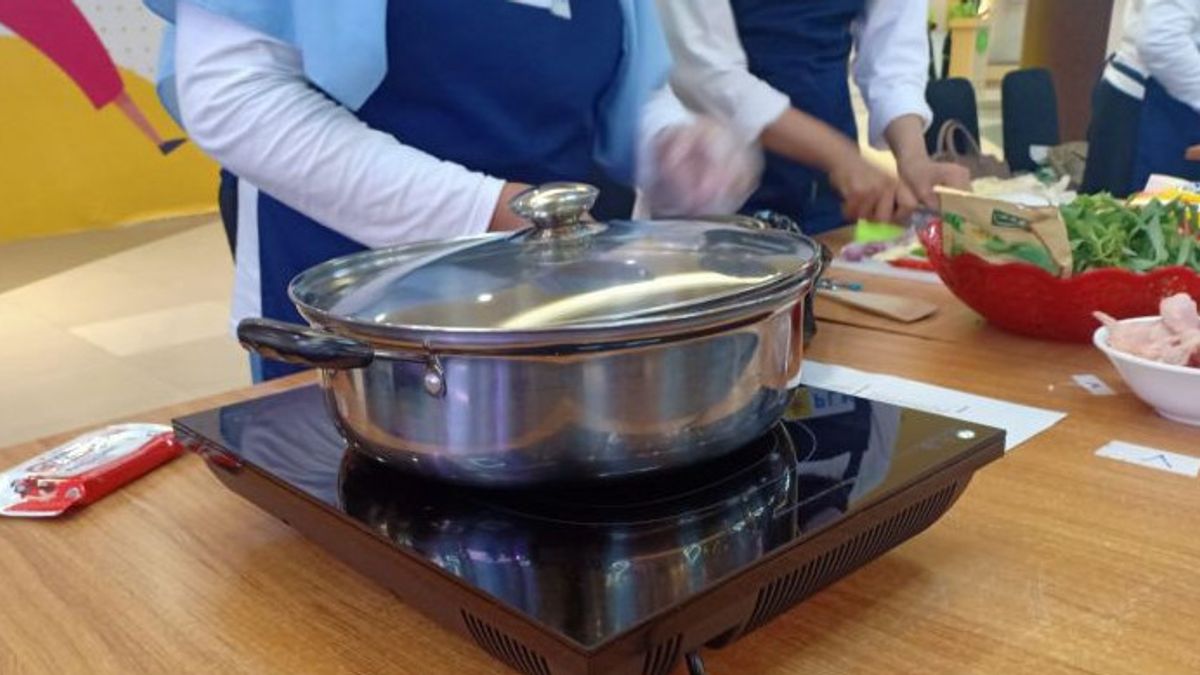JAKARTA - PLN recommends the use of induction cookers in household kitchens because they are safer, more practical, efficient and more comfortable. In addition, the use of induction cookers is also considered to have various advantages and benefits that can be felt by the community and the state.
"PLN highly recommends the use of induction cookers in household kitchens because they are safer, easier and more efficient," said PLN's Executive Vice President of Corporate Communications and CSR Agung Murdifi, Wednesday, April 6.
Agung also mentioned a number of advantages of using an induction stove, the first being that it is more practical because electric stove users do not need to exchange LPG cylinders when they run out.
Agung explained that this stove works when the cooking utensils are placed on the stove, then an alternating electric current is passed from inside the stove body through a coil of wire. The heat generated is directly channeled into the cooking utensils, so that when it comes into contact with body parts it does not feel hot and is relatively safe and the cooking time is also faster because induction cookers allow a more even distribution of heat than gas stoves, thus saving time.
The next advantage of the induction cooker is that it is safer, the stove does not cause fire and smoke so the risk of causing a fire is much smaller, besides that there is also no potential for explosion due to fuel.
"Induction stoves that are without fire and smoke are also healthier for users because they do not produce emissions, besides that they are also friendly to children because they are safer," said Agung.
Meanwhile, in terms of usage, induction cookers are also cheaper than LPG stoves. The trial results show that an average small household consumes 11.4 kg of subsidized LPG at a cost of IDR 79,400 per month after being subsidized by the government of IDR 125,400, so the total cost needed to cook using LPG reaches IDR 204,800 per month.
While the costs needed to cook using an induction cooker are as follows, the price of electricity without subsidies is 1 kWh of Rp. 1,444,7 while the electricity requirement per month is 82 kWh, so the cost required to cook per month using an induction cooker without subsidies is Rp. 118,465 so there is a savings of around Rp. 86,335 per month.
"Faster cooking times will make electric stoves more energy efficient than gas," said Agung.
Not only users who benefit, the state also gets savings on subsidies and imports if people switch to using induction cookers. In PLN's study, for the conversion of 300 thousand users per year, it will be able to save LPG subsidies of around Rp. 450 billion and reduce the cost of importing LPG by Rp. 220 billion.
"If you switch to using an induction cooker, Indonesia will also be energy independent because you don't have to rely on imports. So far, most of the energy supply for LPG is imported," he added.
PLN has also made a number of efforts to foster public interest in switching to induction cookers, namely providing a special price for added power of only Rp. 150 thousand through the Convenient Induction Stove program for customers who buy induction cookers through partners who have cooperation with PLN.
PLN also has an Extra Power service product, which is an additional package of power capacity for new homes. Customers only need to pay a 900 VA power connection fee and get a power capacity of 2,200 VA if they are equipped with an Induction cooker complete with cooking utensils. This program is carried out in collaboration with BUMN Karya and property companies.
"PLN's service products for the induction cooker package are part of the import-to-domestic energy conversion program plan. This step will contribute to strengthening sustainable economic growth," added Agung.
The English, Chinese, Japanese, Arabic, and French versions are automatically generated by the AI. So there may still be inaccuracies in translating, please always see Indonesian as our main language. (system supported by DigitalSiber.id)













